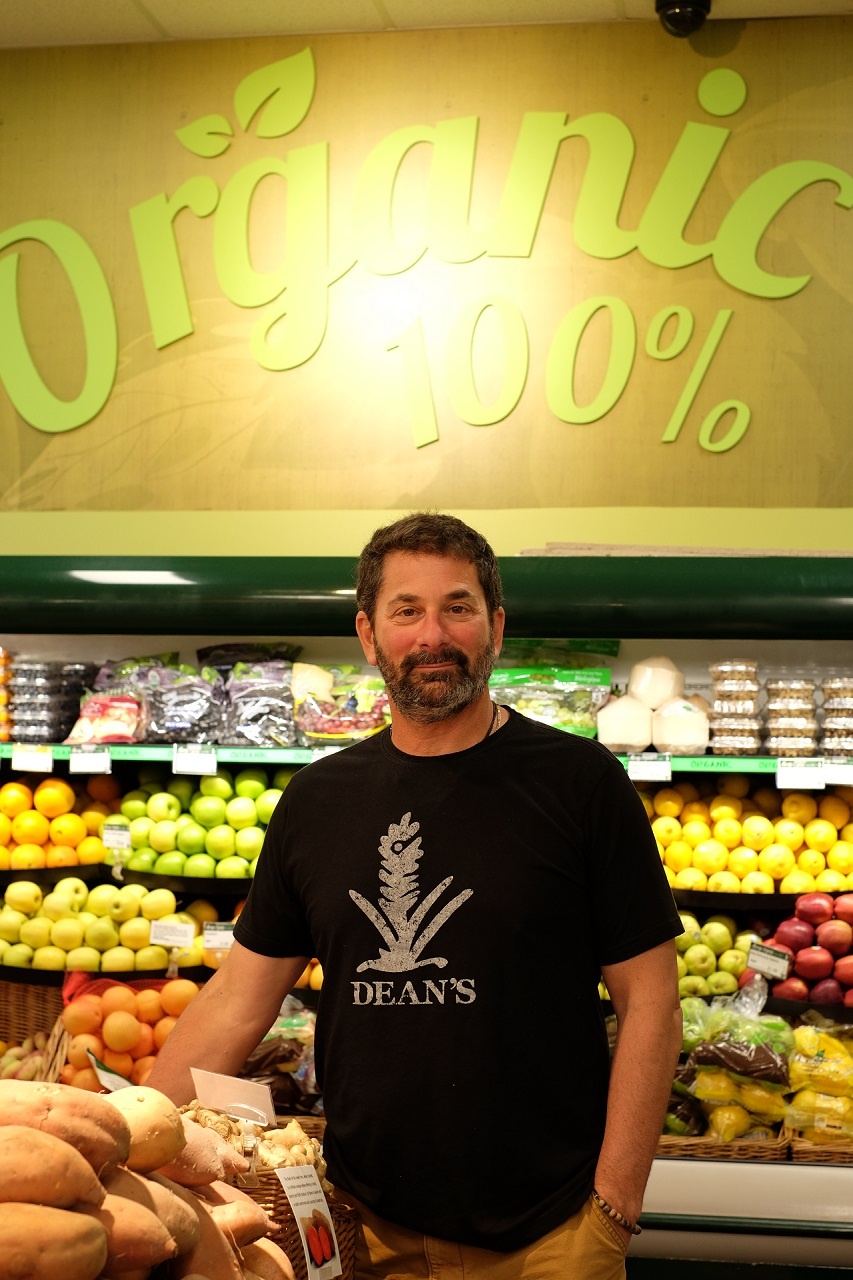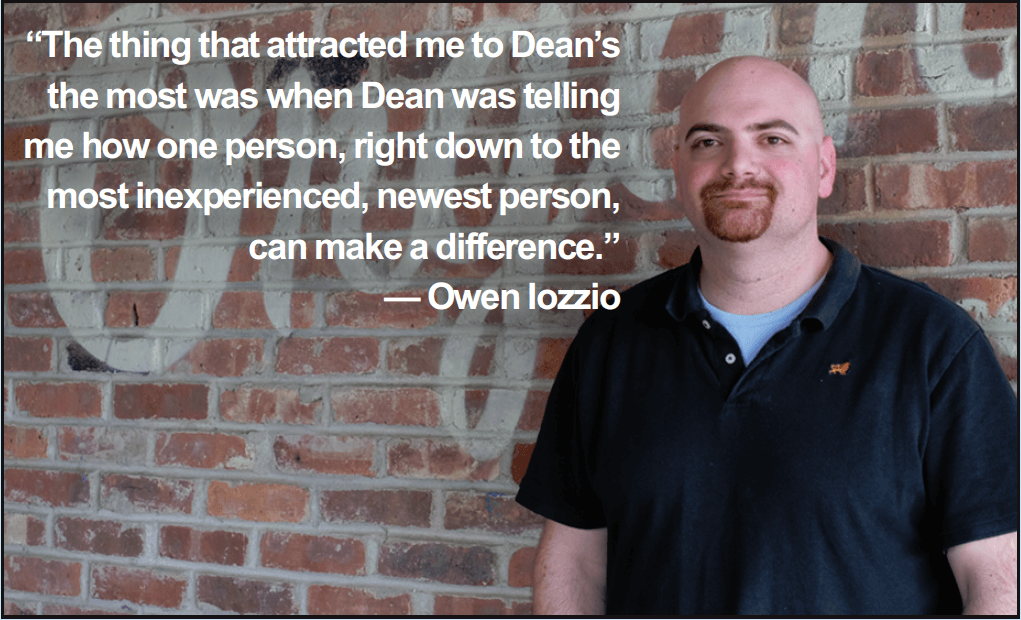The key to developing this dynamic is having a deep-seated culture. This is what WholeFoods Magazine’s 2017 Retailer of the Year, Dean’s Natural Food Market accomplishes. “We have a slogan which is ‘your customer has to want you to win,’” says Dean Nelson, its founder and owner. “We spend as much time developing our culture and being authentic as we do on the dollars and cents of our business.”
The BeginningIt’s not easy running a business, especially a principled business that endeavors to build and maintain the trust of its clientele. Starting one is even harder. Dean’s opened up its first location in 1996 in Ocean, NJ. The market started, says Dean’s wife and co-owner Loretta Nelson, “with that passion for good health.” Both herself and Dean were, prior to opening the

market, living an active, healthy lifestyle, exercising regularly, gradually becoming more aware of what they were eating and eventually becoming vegetarian. Opening the store was an extension of this healthy lifestyle.
“I borrowed money from a family member and opened up my first store,” explains Dean. “It was 5,800 sq ft and my break-even was $1,633 a day. I worked every day open to close. It was a fun and exciting time in our industry. Natural and organic foods were just being discovered and introducing people to our world was a lot of fun. We started with four coworkers. I remember after our first $4,000 day, I called my wife and said, ‘We made it!’”
It wasn’t until nine years later that Dean and Loretta were able to open up a second location. “The industry had matured and with our understanding of running one location, the second, though very challenging was easier,” he states. “By the time we opened our third and fourth, both the industry and our ability to manage our business had matured so it became about continuing to build our culture, find our purpose and create the road map for the future.”
Product IntegrityAt Dean’s, all produce is 100% organic and their product selection has to meet rigorous standards. “Being here and knowing the competition around us, we have to have the best product selection, the best prices, the best integrity program for items we bring in, so we’re becoming known for that,” says Tom Amadruto, store manager of the flagship location in Ocean, NJ. “With our non-GMO policy, we don’t bring in any items unless they’re Non-GMO Project Verified or free of the top ten GMO crops. People know that about us now, they’re coming here for that.”
While the market had been dedicated to organics since the day they opened, the non-GMO policy is something relatively new to the market, established in 2013, when Dean, at the suggestion of a fellow retailer decided to take the step. “Two days later we had a GMO policy,” says Dean. “It was one of the most gratifying things I’ve ever done in the 21 years we’ve been in business. I really felt like we were standing for something. It felt great and we used it as a marketing tool to differentiate ourselves because other retailers are not making that commitment.”
Of course, this was not an easy task to accomplish, turning over a store’s entire inventory so that it meets one’s new standards. “The decision was that we were not going to bring any new products in for a specified period of time that had an at-risk ingredient unless it met those two criteria,” explains Dean. “Then we said we were going to give it some time and vet products out as we brought comparable products in that would take their place. That process probably took two years.”
Although Dean’s commitment to organic and eventual commitment to non-GMO was certainly a challenge, the world has caught up. “Over the years, a lot of companies have turned to organic and non-GMO so it makes it a little bit easier to have those kinds of products,” says Nahum Guerrero, head grocery buyer for the market. “But because of the size of the stores we have, it was very manageable also, and it’s only getting easier.”

With Dean’s product standards, the market not only practices what it preaches, but earns their customer’s trust. “It’s great when a customer comes in now and asks if we carry a particular product and we have to tell them we’ve made a choice not to sell that product because we don’t believe in the integrity of the ingredients,” says Dean. “And then the customer asks what’s wrong with the product and we create a relationship, a value based upon knowledge and information.”
The trust that forms is very valuable because then people don’t have to think twice about shopping there. “We like to say we read our ingredients so the consumer doesn’t have to,” says Eric Nelson, Dean’s son and director of operations.
The bigger picture of making this change is that it also provokes further change. “It influenced the food industry because now when a broker or a sales rep comes in asking for us to carry a product and Nahum looks on the back and sees eurythrenol or dextrose or canola oil, we say, ‘We’re afraid we can’t carry that because it’s not Certified Organic or verified by the Non-GMO Project,’” explains Dean.
Motivating and Rewarding a WorkforceA good deal of Dean’s management team, such as Guerrero and Amadruto, began their tenure at the market as clerks or other entry level positions, forging a career. Dean demands a lot from his employees, but he strives to motivate and inspire them to put forth their best, not just for the good of the market, but for themselves and even more importantly, for each other.
“My role is to ensure the success of everyone,” says Dean. “Thus behind all of the goodness we strive to achieve, there is a demanding business focus. If I am involved in an interview, I express to the candidate, you will never work harder, be pushed further, but respected and appreciated more.”
Dean’s “I Matter” program is the manifestation of this approach. Each year, the market has four goals: Inventory, Labor, Contribution and Purchases. With the exception of Dean and Eric, everybody in the company gets 5% of their income every quarter when those four goals are met. “We call it ‘I Matter’ because we think every single person in here matters and every single person can make a difference and we always want to instill in people that you have an opportunity to impact the person who works next to you,” explains Dean. Instead of just bonuses for individual performances, the program encourages each individual to not only perform their best but also aid and coach coworkers who may not be meeting their potential; for the benefit of the collective.
“It’s not just a financial incentive, it’s really a conscious thing to try to get everyone to chip in and get a teamwork mentality to lend a hand no matter what department, what store,” says Eric.
It’s also very empowering to be able to contribute significantly as an individual. “The thing that attracted me to Dean’s the most was when Dean was telling me how one person, right down to the most inexperienced, newest person, can make a difference,” says Owen Iozzio, database manager for the retailer.
It doesn’t hurt when your workplace stands for something either. “The industry itself is what drew me here, the people are what kept me here,” says Amadruto, who has been vegan for 10 years. “I live the life, I mean, I have kale tattooed on my arm, it’s just part of who I am, so I’m glad Dean has given me the opportunity to grow.”
Dean certainly doesn’t take the responsibility lightly. For example, despite being able to raise his minimum hiring wage to $10 per hour (better than a majority of mainstream, conventional retailers), he laments that his goal of $12 per hour was still out of reach. That’s important to him because he understands that it’s not easy to make a living on that kind of money and he wants to be able to support people properly.
One way he stays grounded as an employer is that Dean and his family actually pay for the groceries in their own store, opting out of having a house account to instead pay at the register. “People need to see us pay for our groceries,” says Dean. “That little thing has really made such a difference. That means more to the staff and more to the consumer and it makes me a better business owner because I understand the cost of goods now.”
 PhilanthropyOne of the most important aspects of Dean’s Natural Food Market that is central to forging a positive and thriving culture is its charitable works. “We really try to have close community ties, not just around our flagship store, but we work with local nonprofits around each of the stores and try to really focus on smaller nonprofits that we know need the help and know will feel the impact of what we’re giving them,” says Andrea Tudor, director of marketing.
PhilanthropyOne of the most important aspects of Dean’s Natural Food Market that is central to forging a positive and thriving culture is its charitable works. “We really try to have close community ties, not just around our flagship store, but we work with local nonprofits around each of the stores and try to really focus on smaller nonprofits that we know need the help and know will feel the impact of what we’re giving them,” says Andrea Tudor, director of marketing.So, while Dean’s supports a variety of local nonprofits in its four locations, two organizations in particular get an exceptional amount of support from the company. One is a cancer respite for women called Mary’s Place in Ocean Grove, NJ, which houses 10 women at a time, offering nutritional counseling, meditation and family services, all free of charge. In addition to financial donations, Mary’s shops at Dean’s for free year round. “These women have cancer, we need to feed them the right food and we’re in a position to do that,” says Dean.
The other nonprofit that gets a bulk of the retailer’s support is KYDS (Konscious Youth Development and Service) which serves the communities of Neptune Township and Asbury Park, NJ, teaching underpriveleged youth mindfulness tools to lead them on a path to a more meaningful life. Dean’s Natural Food Market pays for the organization’s 501(C)3 status, supplies all their food, supplies their pre-printed shirts, and Dean participates in the mentoring programs to teach youths entrepreneurial skills. “I don’t think minorities get a fair shake in this country so I have an affection for that kind of stuff,” expresses Dean.
As it so happens, his support of KYDS came from a serendipitous meeting of the minds in his own store. “I met one their guys shopping here,” he explains. “Walked up to him, treated him to a juice, one thing led to another and as it turned out his spiritual path is very similar to mine. Soon, we were sitting here on Thursdays meditating and I heard about the organization and I liked where it was coming from.”
Dean’s personal spiritual path has been a crucial influence on him and his approach to his business. “For many years it was about the profit, it was about me and material possessions and being successful,” says Dean, describing his approach before discovering mindfulness and meditation. “I always loved serving people, but I was not nearly as happy as I am now that I am able to make a difference for somebody else.”
That too, as it turned out, was a result of him owning the store. Ten years ago, he explains, “I had a customer who was a life coach and we used to have really deep conversations and he would coach me on coaching people because I tended to be a little bit too blunt.” This individual one day recommended the book “Power of Now” by Eckhart Tolle. Not being a big reader, Dean bought the audio disc and “within 15 minutes my life changed forever,” he states.
“It has had a really profound impact on the way we run our company and quite honestly I use the store as a doorway to promote what I consider to be a much, much bigger picture which is having people find awareness in their lives,” he elaborates. “I think there is a synergy between selling organic products and the impact it has on our planet, how it affects our health, but then the next step is ‘Why?’ And the answer is that it’s about consciousness and awareness. I think it has contributed significantly to our success.”
He also encourages his staff to give back. “I want them to see why we need to be successful and the impact our success can have on our community,” says Dean. This involves actually volunteering at places like Mary’s as well as in-store programs and other forms of community outreach.
“We try to get involved with family-based organizations so we can get the whole family thinking about their health and wellness,” says Tudor. “And education has really been a huge focus on just about all of our marketing efforts, everything from getting into the community, sending healthy recipes out in our weekly emails, bringing in experts to give wellness classes in the store — anything from cooking classes to overall wellness talks — all free to our customers as just an added value. So education has been the cornerstone of our marketing efforts I’d say.”
Dean’s is also in the process of building a 50 person community room in order to enhance its community work, holding meditation, mindfulness and yoga classes, all at no charge. “I believe these types of classes will move our society forward,” says Dean.
Most recently, Dean’s held a contest in one of their local school districts as part of their Earth Day Initiative to design a reusable bag. All of the district’s students submitted a bag, which the Dean’s staff narrowed down to two and then used social media to allow people to vote for their favorite. The winner now hangs at the register and all proceeds from the sales of that bag are going to Clean Ocean Action, a charity chosen by the winner of the contest. For Loretta, this was very important because children are our future and any way we can engage with them and encourage activism has a positive impact on our society.
Giving to the community demonstrates one’s devotion to the people you serve. This is something customers will certainly notice and they will understand that by supporting your business they are also supporting their community and ultimately themselves. This relationship with the customer is critical for independent natural products retailers facing growing competition from large companies who answer mostly to shareholders. Dean’s understand this intimately, having developed a deep connection with its communities and the people that shop there.
The market even gets its customers in on the action through a program called the “Dean’s List,” which promotes hundreds of items of which 3% of their sales gets donated to nonprofits in the community. This is important because people want to see where their money is going and when they go to Dean’s they can trust that it is going to be used thoughtfully. “The natural food consumer has always been deeply rooted in principles and values and we have to live those values every day,” says Dean.
Balancing Culture & BusinessWhat is clear from learning about Dean’s Natural Food Market is that having a culture is good for business, but sometimes, the dedication to one’s culture and subscribing to the principles you represent, can feel counterintuitive as a business owner. “I want to be able to inspire businesses to change their model,” explains Dean. “Take the focus off of the money and put the focus on running a business ethically and honestly and being very supportive and not being selfish with the profits.”
“It’s all based on passion and lifestyle and living and wanting it not only for ourselves, but for everyone else,” adds Loretta.
That is not to say he doesn’t recognize the challenge. He embraces it. “Being community and corporate is a real balancing act,” he says. “We want to be a community store, we want to know everybody but we also want to have the fit and finish of a big brand, so we’re constantly balancing the two. We want our staff to be the same, to balance the cultural aspects of the business which is the most important part but also the structure, operational understanding.”
Ultimately, Dean’s Natural Food Market wants to lead by example. “There’s a famous Buddhist teacher Noah Levine and someone once asked him how he taught his children about Buddhism,” recounts Dean. “He said ‘I don’t teach them about Buddhism, I live as much as I can like the Buddha. So through my actions, they will learn how to do the right thing,’ and that’s the way we want to run the company.”WF

Published in WholeFoods Magazine July 2017









